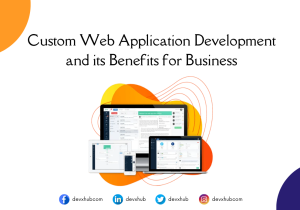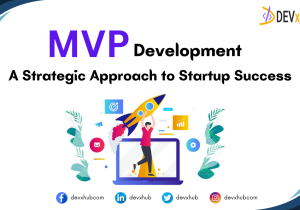Blog - Tech Trends: Predictions for the Future of Software Development
In the rapidly evolving landscape of technology, software development continues to be at the forefront of innovation. The future of software development promises exciting possibilities, challenging paradigms, and transformative changes. This article delves into the predictions for the future of software development, exploring 25 key trends that will shape the industry. From artificial intelligence to decentralized applications, let’s embark on a journey to discover the upcoming trends that will redefine how software is created, deployed, and utilized.
Tech Trends: Predictions for the Future of Software Development
1. AI-Driven Development: The Rise of Intelligent Algorithms
Artificial Intelligence (AI) is poised to revolutionize software development. AI-powered tools will assist developers in writing code, automating mundane tasks, and even predicting potential bugs. By leveraging machine learning, developers can create smarter, more efficient software systems.
2. Quantum Computing: Unleashing Unprecedented Processing Power
Quantum computing holds the potential to solve complex problems that are currently beyond the capabilities of classical computers. This technology will enable software developers to address intricate challenges in cryptography, optimization, and simulations.
3. Blockchain and Decentralized Applications (DApps)
Blockchain technology is set to transform the way applications are developed and deployed. Decentralized applications (DApps) offer enhanced security, transparency, and trust, as data is stored across a network of nodes rather than a centralized server.
4. 5G and Edge Computing: Accelerating Data Processing
The advent of 5G networks coupled with edge computing will lead to faster data transmission and reduced latency. This will enable the creation of real-time applications that require instant data processing, revolutionizing user experiences.
5. Low-Code/No-Code Development: Empowering Non-Developers
Low-code and no-code platforms will empower individuals with limited coding skills to create functional applications. This democratization of software development will result in increased innovation and a broader range of software solutions.
6. DevOps 2.0: Integrating Security into Development
DevOps practices will evolve to include DevSecOps, emphasizing the integration of security measures throughout the software development lifecycle. This approach ensures that security is not an afterthought but an integral part of the development process.
7. Augmented Reality (AR) and Virtual Reality (VR) Applications
AR and VR technologies will continue to reshape industries beyond gaming, including education, healthcare, and entertainment. Developers will play a pivotal role in creating immersive experiences that enhance user engagement.
8. Cybersecurity: Battling Evolving Threats
As software becomes more integral to daily life, cybersecurity will be paramount. Developers will need to implement robust security measures to safeguard sensitive data and protect users from evolving cyber threats.
9. Internet of Things (IoT) Ecosystem Expansion
The IoT ecosystem will expand, connecting a myriad of devices and enabling seamless communication between them. Software developers will need to adapt to the challenges of interconnectivity and data management.
10. Voice User Interfaces (VUI): The Era of Voice-Activated Apps
Voice user interfaces will gain prominence, allowing users to interact with software using natural language. Developers will need to design intuitive voice-activated applications that offer a user-friendly experience.
11. Continuous Integration and Continuous Deployment (CI/CD)
CI/CD practices will become even more essential for delivering software updates rapidly and reliably. Automation will streamline the process of building, testing, and deploying software, ensuring seamless user experiences.
12. Progressive Web Apps (PWAs): Bridging the Gap Between Web and Mobile
PWAs will blur the lines between web and mobile applications, offering fast loading times, offline access, and enhanced performance. Developers will need to optimize their software for different devices and platforms.
13. Ethical and Responsible AI Development
With the rise of AI, ethical considerations will become crucial. Developers will need to ensure that AI algorithms are unbiased, transparent, and respectful of user privacy.
14. Big Data and Predictive Analytics
The abundance of data will continue to drive software innovation. Developers will harness big data and predictive analytics to create applications that offer personalized experiences and data-driven insights.
15. Cloud-Native Technologies: Scalability and Flexibility
Cloud-native technologies will enable developers to build scalable and flexible applications that can seamlessly adapt to changing demands. Microservices, containers, and serverless architecture will play a pivotal role in this transformation.
16. Gesture-Based Interfaces: Beyond Touchscreens
Gesture-based interfaces will introduce a new dimension of interaction. Developers will need to design software that recognizes and responds to gestures, expanding the possibilities of user engagement.
17. Neural Networks and Deep Learning
Neural networks and deep learning algorithms will continue to advance, enabling software to perform complex tasks such as image recognition and natural language processing with greater accuracy.
18. Cross-Platform Development: Reaching Wider Audiences
Cross-platform development tools will enable developers to create applications that work seamlessly across different operating systems and devices, reaching a broader audience.
19. Robotic Process Automation (RPA)
RPA will automate repetitive tasks in software development and other industries, freeing up developers to focus on more strategic and creative aspects of their work.
20. Sustainability in Software: Green Coding
As environmental concerns grow, developers will strive to create energy-efficient software that minimizes resource consumption, contributing to a more sustainable future.
Tech Trends: Predictions for the Future of Software Development – FAQs
How will AI impact the future of software development?
AI will revolutionize software development by automating tasks, predicting bugs, and enabling smarter code creation.
What are the benefits of low-code/no-code development platforms?
Low-code/no-code platforms empower non-developers to create applications, fostering innovation and diversity in software solutions.
How can developers ensure the ethical development of AI algorithms?
Developers must prioritize transparency, fairness, and user privacy when creating AI algorithms.
What role will cybersecurity play in future software development?
Cybersecurity will be essential to safeguard user data and protect against evolving cyber threats.
How will IoT expansion influence software development?
Developers will need to adapt to the challenges of interconnectivity and data management as the IoT ecosystem expands.
What is the significance of sustainable coding practices?
Sustainable coding aims to create energy-efficient software that reduces resource consumption and contributes to environmental conservation.
Conclusion
The future of software development promises an exciting journey filled with transformative trends that will shape the way we interact with technology. From AI-driven development to sustainable coding practices, developers will play a pivotal role in driving innovation, creating user-centric experiences, and addressing the challenges of a rapidly evolving digital landscape. As we look ahead, these predictions offer a glimpse into a future where software development is not just about code, but about shaping the way we live and work in an increasingly digital world.
Related Posts
Categories
- App Development (2)
- Design (2)
- DEVxHUB (30)
- Digital Marketing (2)
- Guide (24)
- It Bangladesh (1)
- Logo design (1)
- Operating system (1)
- Personal Improvement (14)
- Planning (4)
- Project management (3)
- Social media (2)
- Software Development (5)
- Software Quality Assurance (8)
- Startups (1)
- Team work (1)
- UI UX (1)
- Web Development (6)
Main Tags
- 2024
- Android
- app development
- bangladesh
- content writing
- design
- devxhub
- Digital marketing
- Guide
- IOS
- It
- logo design
- Operating system
- Personal Improvement
- planning
- project management
- social media
- Software Development
- Software Quality Assurance
- software testing
- software testing types
- Startups
- Success
- team
- UI UX
- UI UX design
- VR
- Web Development















